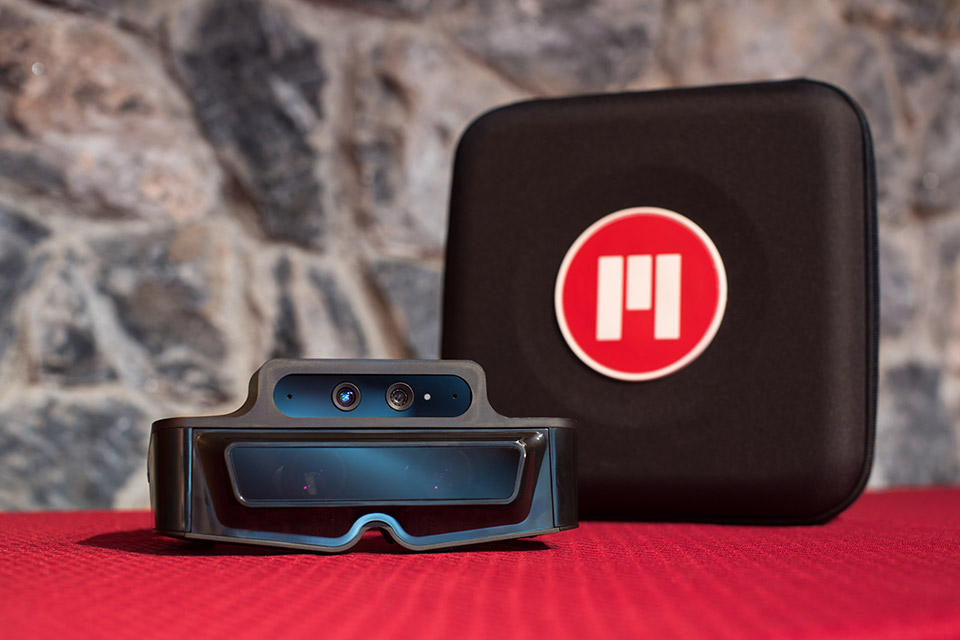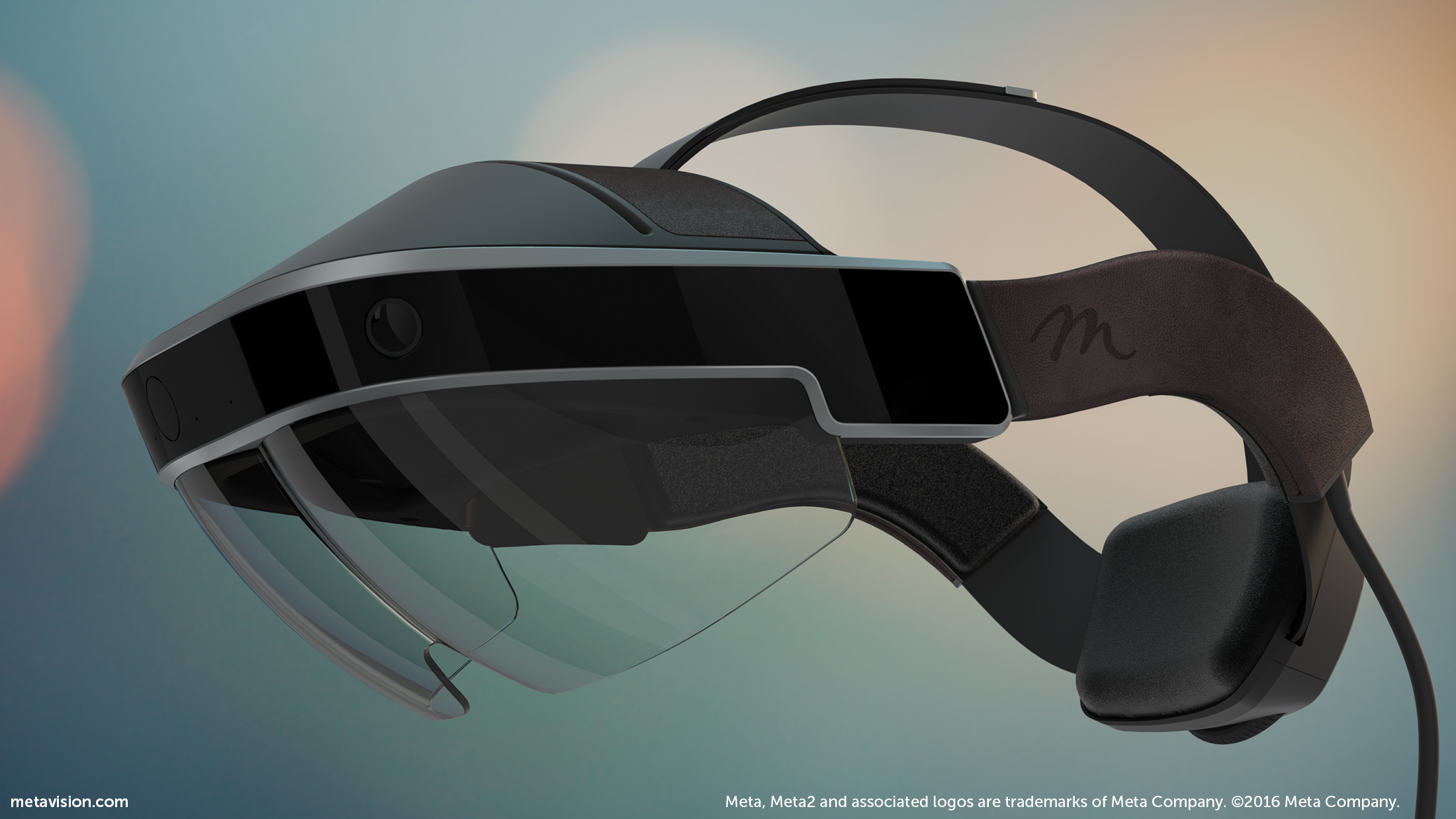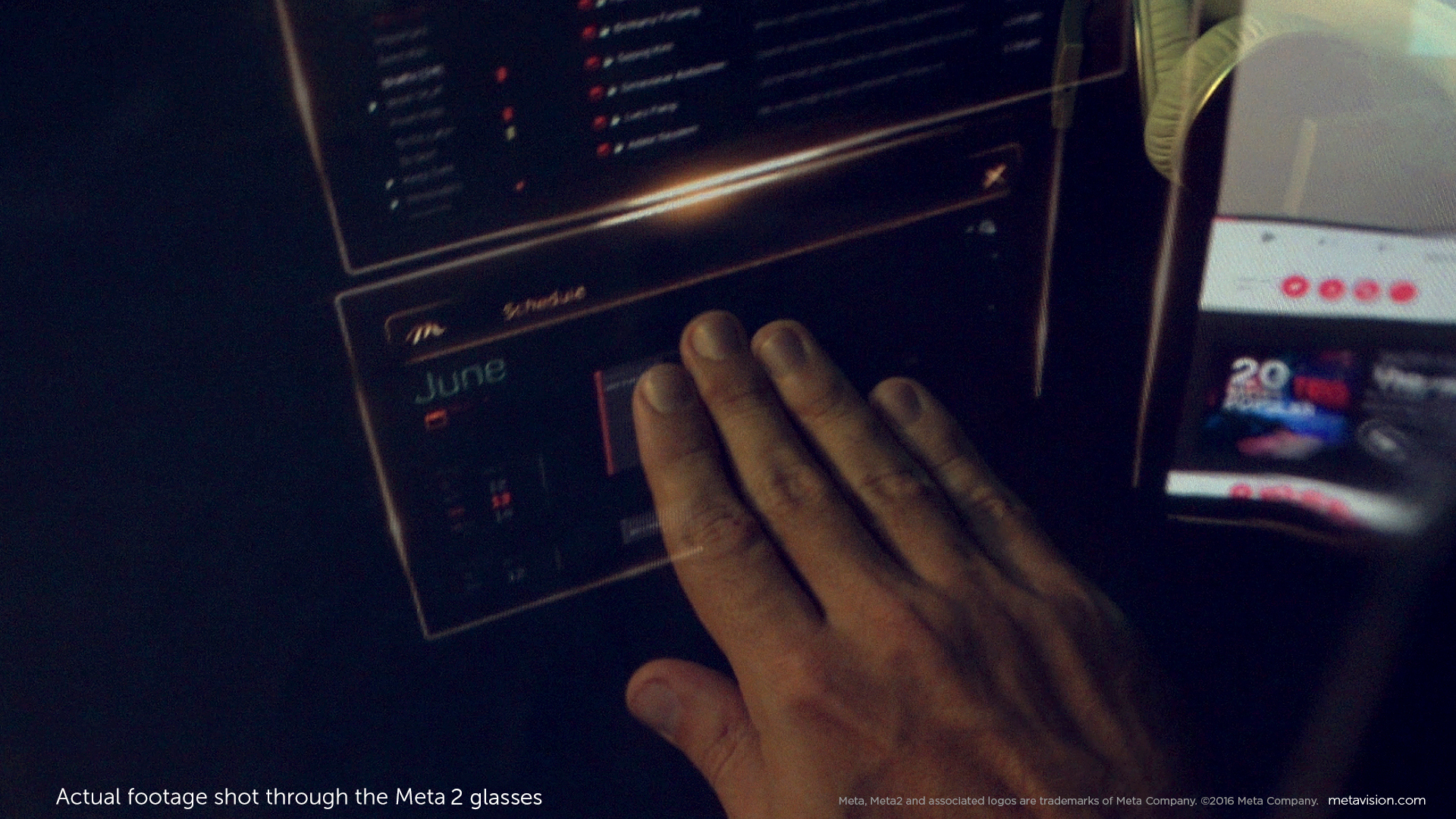[tc_aol_on code=”519544803″]
As modern virtual reality welcomes its consumer moment with the impending releases of the HTC Vive and Oculus Rift, off in the distant far-less-sexy enterprise space exists a class of augmented devices that will eventually replace our smartphones.
Right now this industry is full of products that are cumbersome and ugly enough that you’d probably swipe left on Beyoncé wearing a pair, but this past week I had the chance to play with one that was, okay, still pretty unfashionable, but also really amazing.
Meta CEO Meron Gribetz unveiled the Meta 2 augmented reality headset at TEDx 2016 last month, showing off — among other things — the headset’s incredibly large, near 90-degree, field-of-view.
Following the event, the team from Meta invited me and the TC video crew down to their offices in Redwood City to take a look at their “natural machine.”
The company had grown quite a bit since TechCrunch’s last demo with them in 2014. The former Y-Combinator company has hired aggressively and gathered funding, including a $23 million Series A last year.
After considerable hype (and a ceremonial red velvet cloth unveiling) I had the chance to try it on. Check out the video above for footage from the demo and my point-of-view.
There were definitely moments of brilliance. I really could nerd out about the Meta 2’s (2560×1440) display for days.
Field-of-view (FoV) matters a hell of a lot more on augmented reality devices than it does on VR headsets. With virtual reality, the more squashed the FoV, the more constrained your viewpoint is, but everything that isn’t the screen is just blackness and thus not all that distracting. In AR, low FoV means that it looks like there’s a little translucent window into the virtual world that you have to fit floating 3D content into. It sucks.
The original Meta (also tethered) had a FoV between 25 and 35 degrees which is quite small but comparable to other existing AR experiences, though still a bit less than HoloLens’ speculated FoV.

The near 90-degree field-of-view on the new Meta 2 is more expansive than anything I’ve seen to date and was sizable enough that everything I was viewing felt like it had visual context and wasn’t just butting into my regularly scheduled line of sight. For comparison’s sake, the Gear VR mobile headset offers 98-degree field-of-view.
The tethered nature of the Meta 2 is undoubtedly what makes a FoV of this size possible. Microsoft could likely physically do the same on the HoloLens but it’s all about tradeoffs at this point, and Microsoft chose to give developers all-in-one mobility where Meta chose to anticipate advances in technology and give developers a wired experience that it believes in can untether and shrink before Meta goes on to become a consumer product.
“Generation over generation you’re going to see a dramatic miniaturization,” Ryan Pamplin, Meta’s VP of Sales and Partnerships, told me. “Today it’s about getting it in the hands of all of the developers who have been waiting for this.”
Meta CEO Meron Gribetz also believes these devices will shrink down significantly, but once that happens, he believes consumer focuses will shift away from hardware.
“… in about 5 years, these are all going to look like strips of glass on our eyes that project holograms.” Gribetz said onstage at TEDx 2016 last month. “And just like we don’t care so much about which phone we buy in terms of the hardware; we buy it for the operating system, as a neuroscientist, I always dreamt of building the IOS of the mind, if you will.”

I’m not as sold on the actual interface elements for the Meta 2 as I am on the hardware. While the navigation was simple to learn, I question whether the “natural machine” is approaching input realistically.
Being surrounded by the tech-obsessed posse that I was, I had little appreciation for the fact that I did indeed look like a total idiot while I was navigating the Meta 2 demo. But to be honest, I was just having too much fun to care.
Worrying about appearances can feel shallow when you’re grasping at the future through a product as mind-bogglingly cool as Meta 2, but when you consider the theoretical potential of augmented reality devices as smartphone replacements you need to be more critical.
Even if the Meta 2 had the form factor of a pair of Wayfarers, I still wouldn’t be caught dead reaching my arms out and grabbing shit out of the sky in public. I will grab shit out of the sky for days in virtual reality where I’m locked into my obliviousness and in a space like my living room, but I can only crunch so much tech in the wide open.
That being said, the hand-tracking controls were a bit more brutish than I would hope, especially dim in comparison to my recent experiences with Leap Motion’s latest Orion update. Grabbing virtual items with Meta 2 required me to thrust my open hand into a virtual object and close my fingers to make a fist in order to select and move the objects. This was certainly simple enough for moving larger, otherwise stationary objects like a digital computer monitor, but the occasionally jittery demo left me somewhat skeptical that I would be able to tap a hyperlink with ease from a virtual web browser though it is apparently easy to utilize a physical keyboard and mouse in conjunction with the device.
Much of these differences in quality come from the fact that while Leap Motion is making dynamic digital skeletons of your hands, Meta is using a variety of sensors and a high-def camera to actively map not only your hands but the environment they are manipulating. I have no doubts that these technologies will only continue to improve, but at the moment they were a bit of a let down compared to the mind-bending display.
If/when augmented reality catches on with consumers, I also have significant doubts that hand-tracking will play a major role in how we interact with reality. Among other things, it’s just too conspicuous.

Hands and fingers may be the more precise input option in theory, but the discretion offered by eye-tracking will likely make it the go-to input method for augmented reality consumer devices moving forward (keep in mind that right now Meta 2 is first-and-foremost a developer kit for an enterprise-focused solution).
Input will work itself out as augmented reality companies adapt to consumer, ahem, input, but a major key right now is getting the tech to a point where consumers give a shit. The Meta 2 will help make that happen, but it’s on developers to dream up the use cases that prove the platform.
Even as companies like Meta and Microsoft prepare the releases of their dev kits, a strange beast looms on the horizon of augmented reality (i.e. somewhere in Miami). Magic Leap, which has raised nearly $1.4 billion from investors like Google and Alibaba, is building a light field display which will beam holographic images directly onto your eyeballs. Light field displays, which Pamplin called “exciting,” have the potential to dramatically shrink the size of today’s existing AR headsets.
The mainstream dominance of augmented reality seems flexibly inevitable. While virtual reality is grabbing early headlines with consumer devices headed to market, keep in mind that companies have been building expensive enterprise-focused VR headsets for decades to get to this point. The Meta 2 is an early step towards an augmented future I’m sure we’re at least a decade from, but innovative developers ready to hop on the platform when it launches later this year can likely get us a head start.
Pre-orders of the $949 Meta 2 developer kit go live today and the company says devices will ship in Q3 of 2016.






























Comment